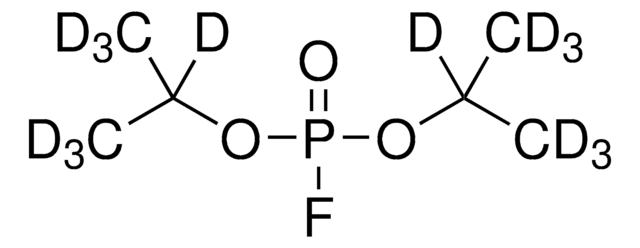14202
Diisopropyl-fluorophosphatase
≥30 U/mg
Se connecterpour consulter vos tarifs contractuels et ceux de votre entreprise/organisme
About This Item
Produits recommandés
Source biologique
fermentation/recombinant
Forme
lyophilized solid
Activité spécifique
≥30 U/mg
Température de stockage
−20°C
Conditionnement
Bottomless glass bottle. Contents are inside inserted fused cone.
Définition de l'unité
One unit corresponds to the amount of enzyme which hydrolyzes 1 μmol diisopropyl fluorophosphate per minute at pH 8.1 and 22 °C
Mention d'avertissement
Danger
Mentions de danger
Conseils de prudence
Classification des risques
Resp. Sens. 1
Code de la classe de stockage
11 - Combustible Solids
Classe de danger pour l'eau (WGK)
WGK 1
Point d'éclair (°F)
Not applicable
Point d'éclair (°C)
Not applicable
Équipement de protection individuelle
Eyeshields, Gloves, type N95 (US)
Certificats d'analyse (COA)
Recherchez un Certificats d'analyse (COA) en saisissant le numéro de lot du produit. Les numéros de lot figurent sur l'étiquette du produit après les mots "Lot" ou "Batch".
Déjà en possession de ce produit ?
Retrouvez la documentation relative aux produits que vous avez récemment achetés dans la Bibliothèque de documents.
Jürgen Gäb et al.
Analytical and bioanalytical chemistry, 396(3), 1213-1221 (2009-11-28)
The enzyme diisopropyl fluorophosphatase (DFPase, EC 3.1.8.2) from the squid Loligo vulgaris effectively catalyzes the hydrolysis of diisopropyl fluorophosphate (DFP) and a number of organophosphorus nerve agents, including sarin, soman, cyclosarin, and tabun. Until now, determination of kinetic data has
Marc-Michael Blum et al.
Biochemistry, 47(18), 5216-5224 (2008-04-10)
A wide range of toxic organophosphorus pesticides and nerve agents is effectively hydrolyzed by the structurally related phosphotriesterase enzymes paraoxonase (PON1) from human plasma and diisopropyl fluorophosphatase (DFPase) from the squid Loligo vulgaris. Both enzymes have potential use as medical
Marc-Michael Blum et al.
Proceedings of the National Academy of Sciences of the United States of America, 106(3), 713-718 (2009-01-13)
Hydrogen atoms constitute about half of all atoms in proteins and play a critical role in enzyme mechanisms and macromolecular and solvent structure. Hydrogen atom positions can readily be determined by neutron diffraction, and as such, neutron diffraction is an
Julian C H Chen et al.
Acta crystallographica. Section D, Biological crystallography, 66(Pt 11), 1131-1138 (2010-11-03)
Diisopropyl fluorophosphatase (DFPase) is a calcium-dependent phosphotriesterase that acts on a variety of highly toxic organophosphorus compounds that act as inhibitors of acetylcholinesterase. The mechanism of DFPase has been probed using a variety of methods, including isotopic labelling, which demonstrated
Debra A Gearhart et al.
Toxicology and applied pharmacology, 218(1), 20-29 (2006-11-25)
Diisopropylfluorophosphate, originally developed as a chemical warfare agent, is structurally similar to nerve agents, and chlorpyrifos has extensive worldwide use as an agricultural pesticide. While inhibition of cholinesterases underlies the acute toxicity of these organophosphates, we previously reported impaired axonal
Notre équipe de scientifiques dispose d'une expérience dans tous les secteurs de la recherche, notamment en sciences de la vie, science des matériaux, synthèse chimique, chromatographie, analyse et dans de nombreux autres domaines..
Contacter notre Service technique









